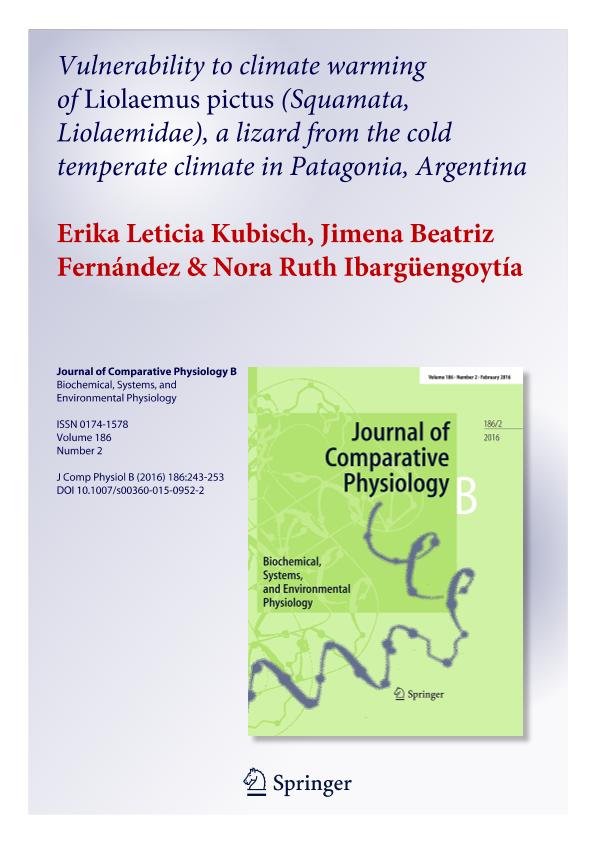Artículo
Vulnerability to climate warming of Liolaemus pictus (Squamata, Liolaemidae), a lizard from the cold temperate climate in Patagonia, Argentina
Fecha de publicación:
02/2016
Editorial:
Springer Heidelberg
Revista:
Journal of Comparative Physiology B: Biochemical, Systems and Environmental Physiology
ISSN:
0174-1578
Idioma:
Inglés
Tipo de recurso:
Artículo publicado
Clasificación temática:
Resumen
The vulnerability of populations and species to global warming depends not only on the environmental temperatures, but also on the behavioral and physiological abilities to respond to these changes. In this sense, the knowledge of an organism’s sensitivity to temperature variation is essential to predict potential responses to climate warming. In particular, it is interesting to know how close species are to their thermal limits in nature and whether physiological plasticity is a potential short-term response to warming climates. We exposed Liolaemus pictus lizards, from northern Patagonia, to either 21 or 31 °C for 30 days to compare the effects of these treatments on thermal sensitivity in 1 and 0.2 m runs, preferred body temperature (Tpref), panting threshold (Tpant), and critical minimum temperature (CTMin). Furthermore, we measured the availability of thermal microenvironments (operative temperatures; Te) to measure how close L. pictus is, in nature, to its optimal locomotor performance (To) and thermal limits. L. pictus showed limited physiological plasticity, since the acclimation temperature (21 and 31 °C) did not affect the locomotor performance nor did it affect Tpref, the Tpant, or the CTMin. The mean Te was close to To and was 17 °C lower than the CTMax. The results suggest that L. pictus, in a climate change scenario, could be vulnerable to the predicted temperature increment, as this species currently lives in an environment with temperatures close to their highest locomotor temperature threshold, and because they showed limited acclimation capacity to adjust to new thermal conditions by physiological plasticity. Nevertheless, L. pictus can run at 80 % or faster of its maximum speed across a wide range of temperatures near To, an ability which would attenuate the impact of global warming.
Archivos asociados
Licencia
Identificadores
Colecciones
Articulos(INIBIOMA)
Articulos de INST. DE INVEST.EN BIODIVERSIDAD Y MEDIOAMBIENTE
Articulos de INST. DE INVEST.EN BIODIVERSIDAD Y MEDIOAMBIENTE
Citación
Kubisch, Erika Leticia; Fernandez, Jimena Beatriz; Ibarguengoytía, Nora; Vulnerability to climate warming of Liolaemus pictus (Squamata, Liolaemidae), a lizard from the cold temperate climate in Patagonia, Argentina; Springer Heidelberg; Journal of Comparative Physiology B: Biochemical, Systems and Environmental Physiology; 186; 2; 2-2016; 243-253
Compartir
Altmétricas




